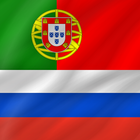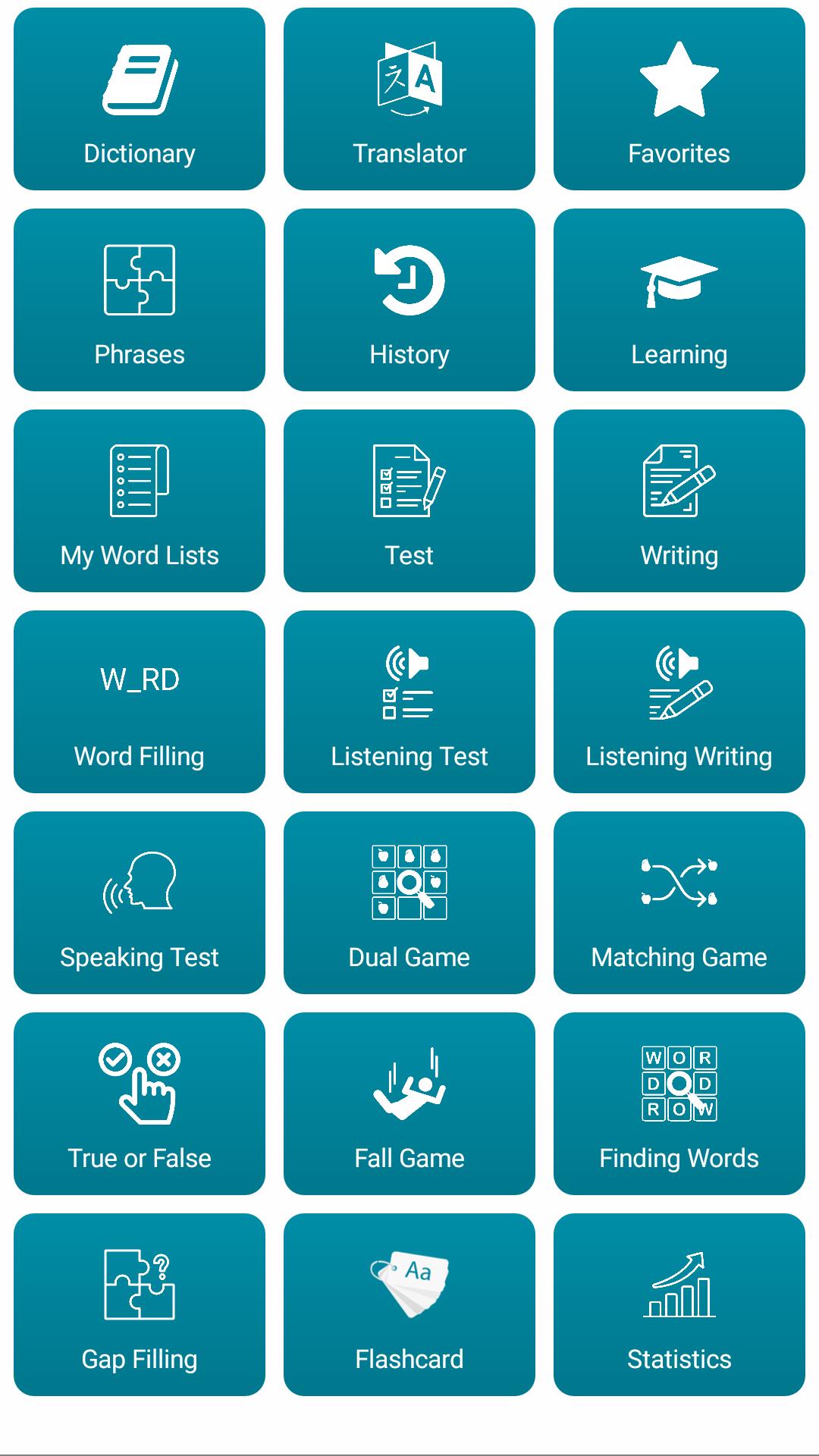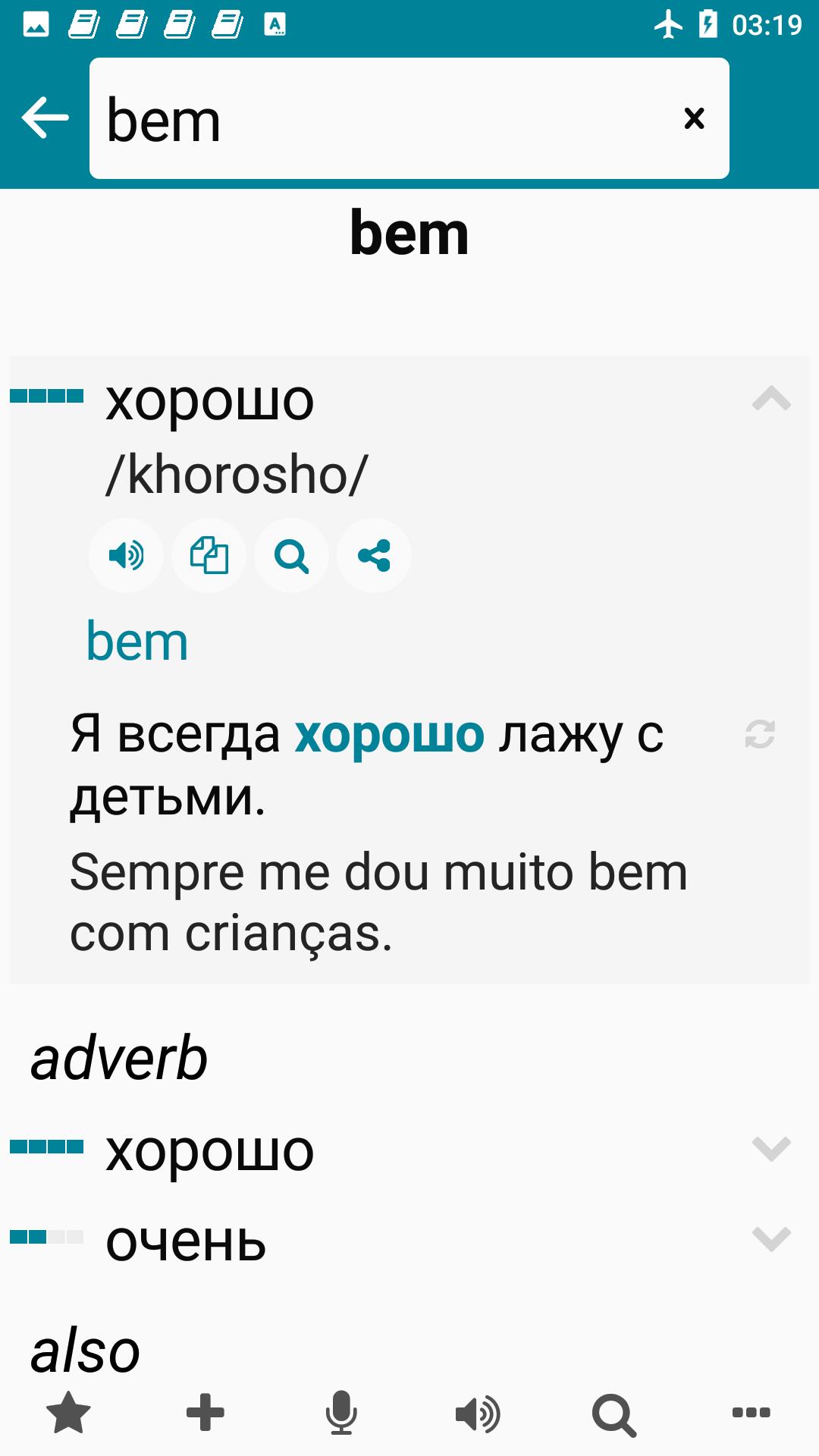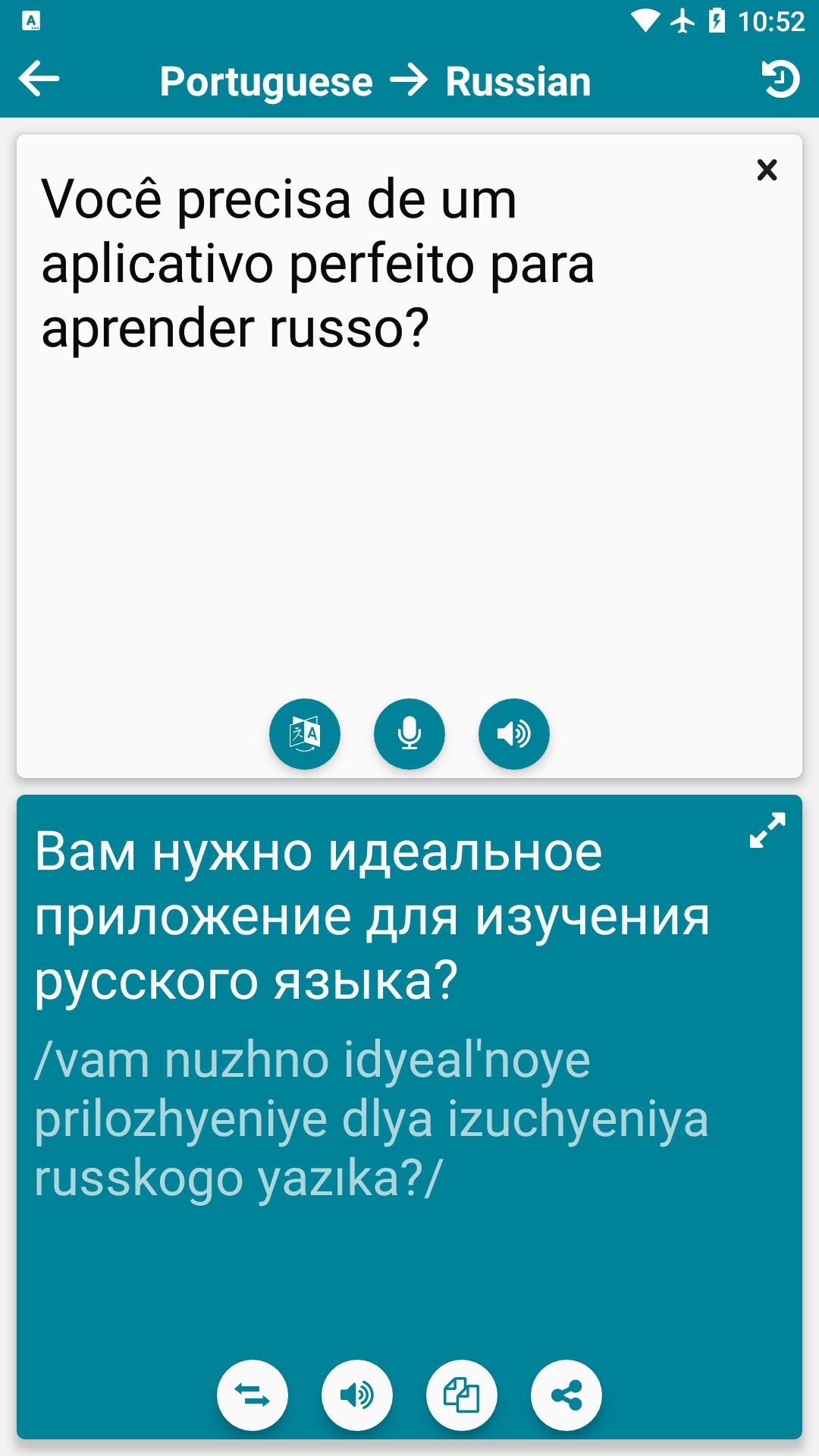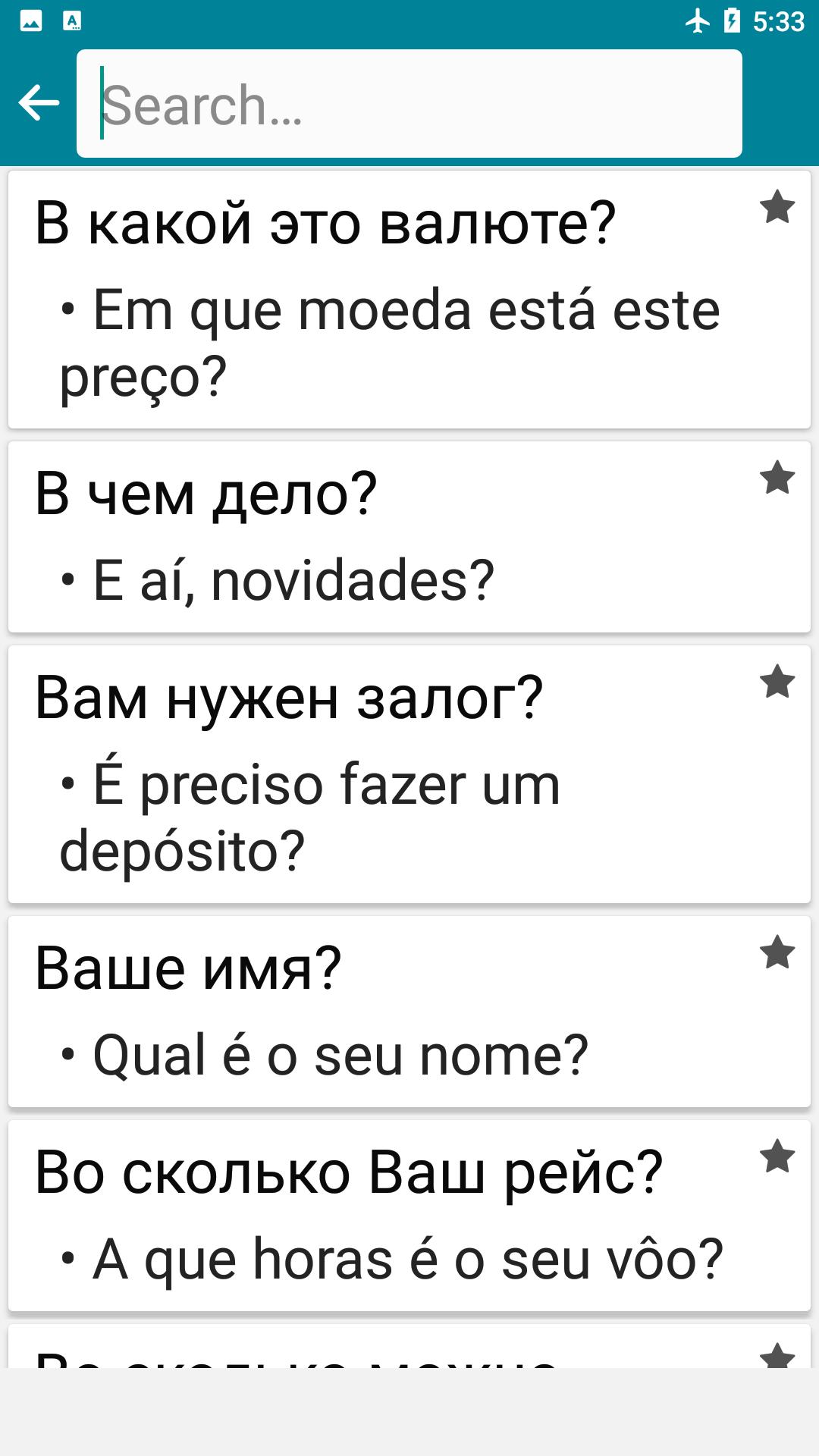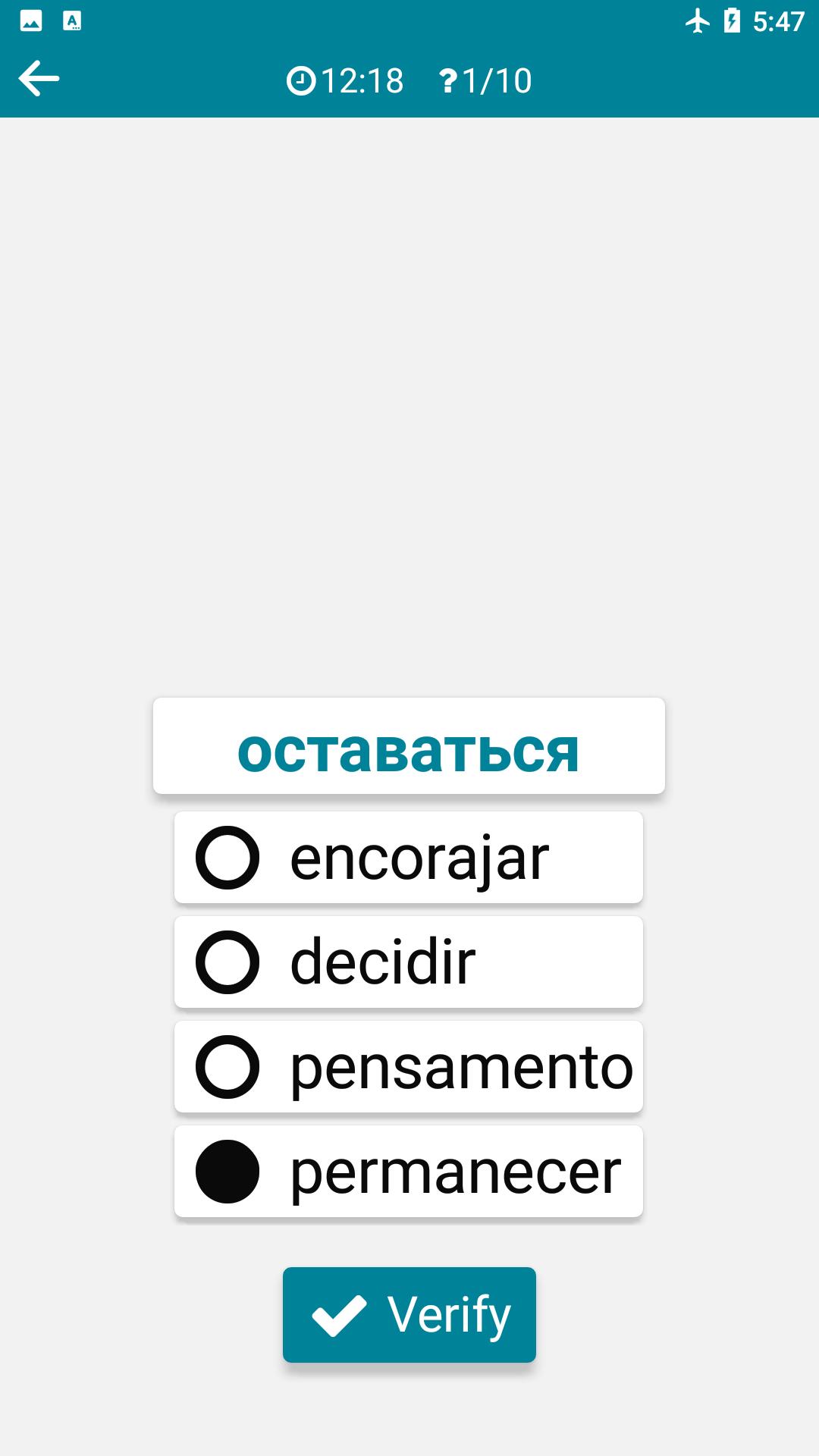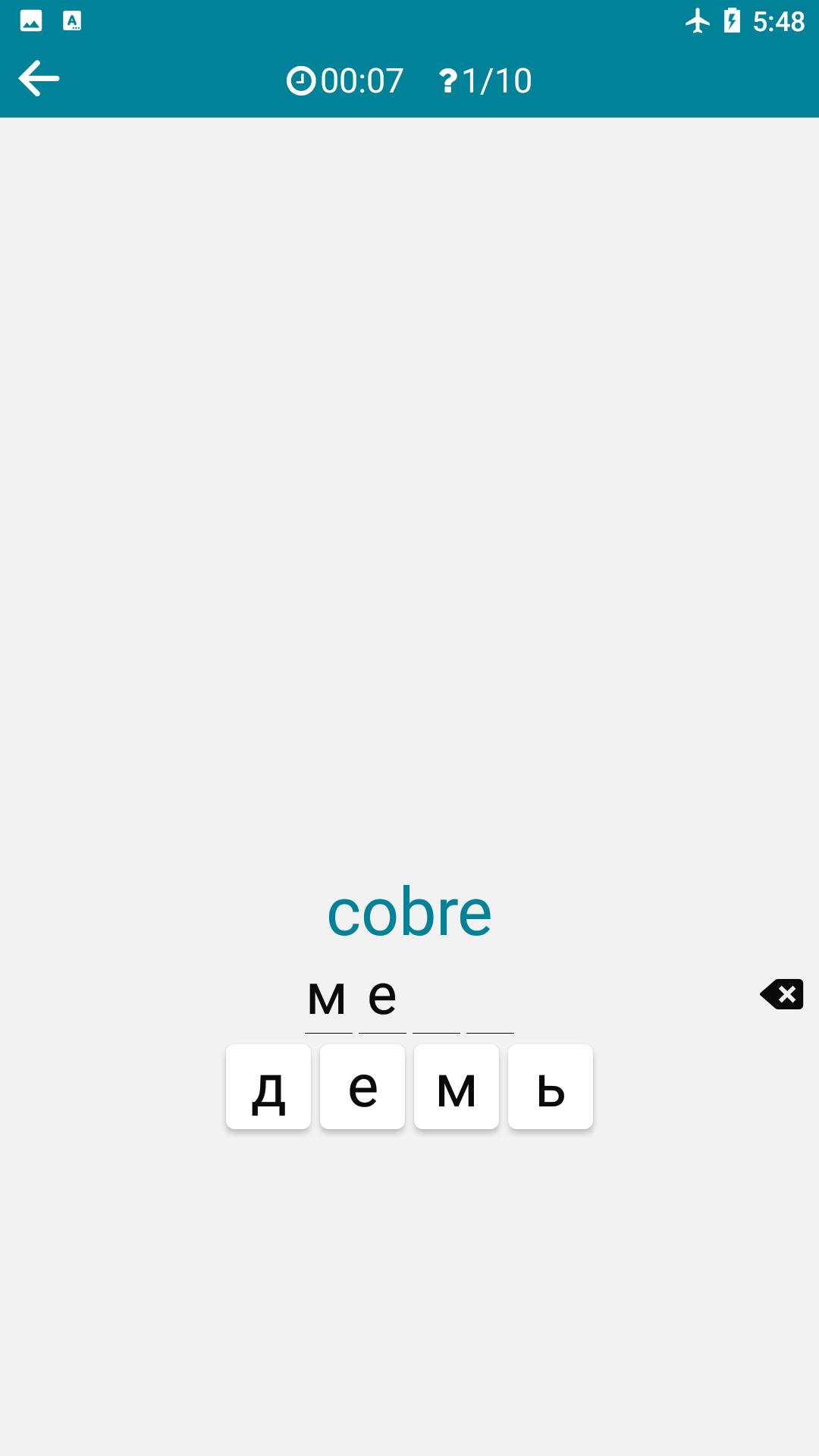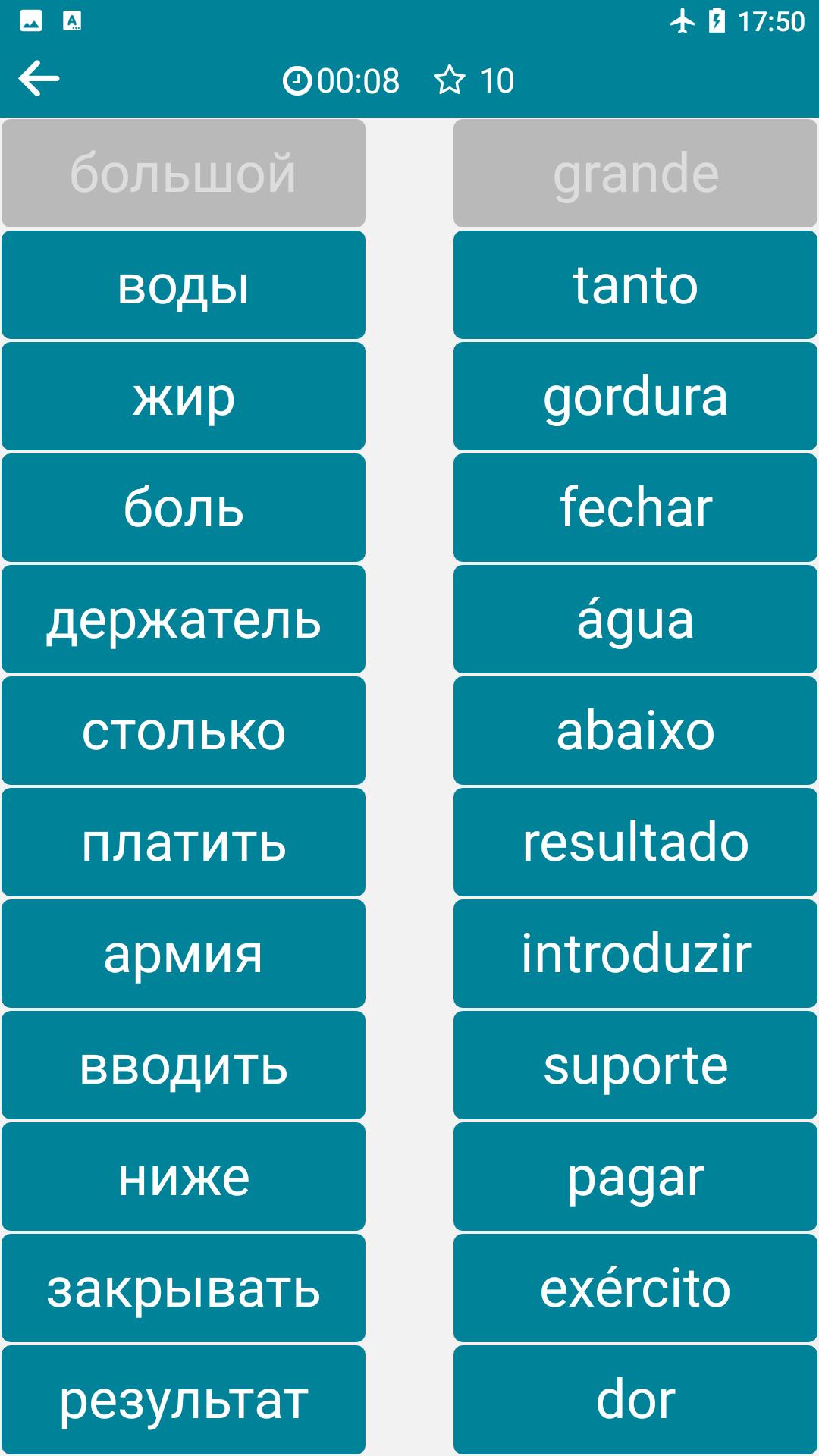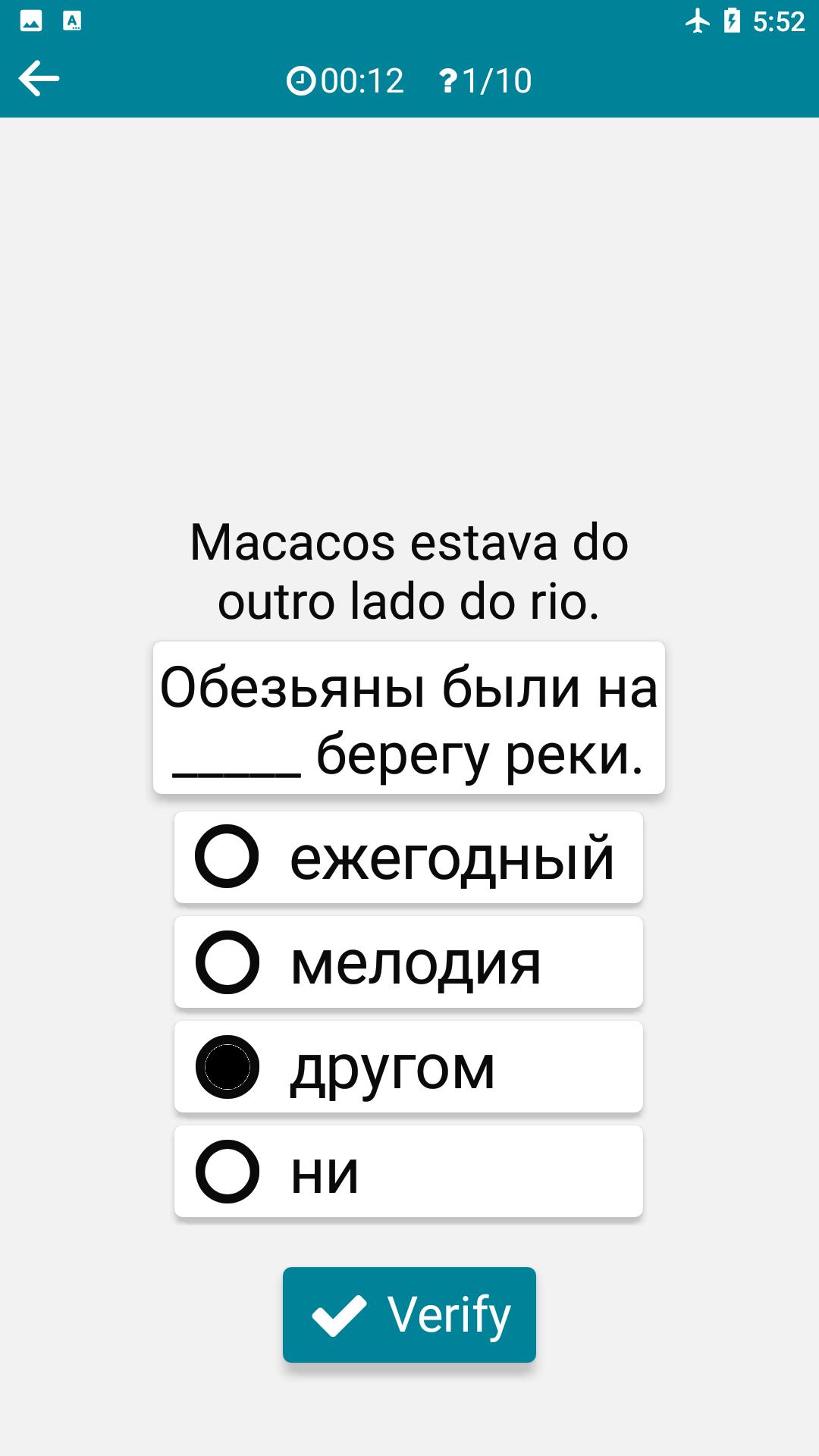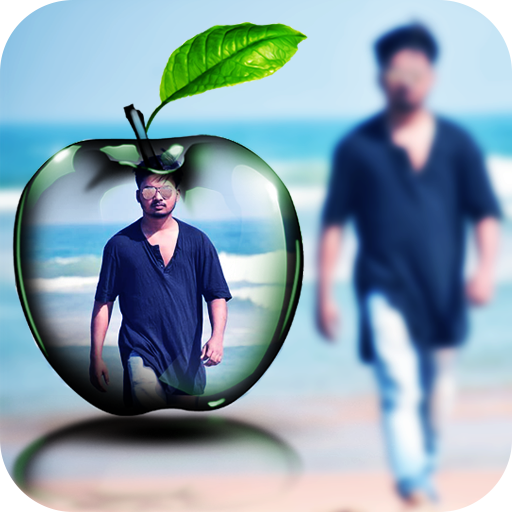Portuguese Russian dictionary, translator, learn words with games, tests, more.
Learn Portuguese / Russian words with games.
Save time and money while learning Portuguese / Russian language with this app.
A quick Portuguese Russian offline dictionary, alternative translation, frequently used Portuguese / Russian sentences, tests (writing, listening, speaking) and games...
Everything you need to learn Portuguese / Russian vocabulary quickly.
🇷🇺️ 🇵🇹️ 🇧🇷️ Russian Portuguese Dictionary :
• It can instantly translate from Russian to Portuguese or from Portuguese to Russian without the need for internet. It works offline.
• In the database;
Russian to Portuguese 114,000,
Portuguese to Russian 92,000 words and phrases. You can access hundreds of thousands of words and sentences (Portuguese - Russian translations) in the database very quickly.
• Suggests suggestions as soon as you start writing.
• You can make voice calls with "Speech recognition" feature.
• Sorts the meanings of the word according to the frequency of usage and gives percentage information.
• You can see and listen to the usage of the word in the sentence with examples.
• You can learn words more easily with example sentences.
• You can turn off one-way dialing and dial in either direction.
• Your searches are sorted back to old and added to the "History".
• You can reach words faster by adding them to "Favorites".
• You can learn your favorites more permanently with tests and games.
🇵🇹️ 🇧🇷️ 🇷🇺️ Portuguese Russian Translator :
• You can translate from Russian to Portuguese or from Portuguese to Russian.
• You can make voice translation with "Speech recognition" feature.
• You can listen to your translations.
• Your translations are saved in "History".
Phrases:
• You can find and listen to common Portuguese - Russian phrases used in daily life.
Flashcard:
• You can view the list of words by listening in order. If you wish, you can mark the ones you memorize. Thus, you do not come across words and tests you know.
Test:
• Test yourself with the classic multiple choice test.
Dual Game:
• You can learn by having fun in your spare time by trying to find the 16 words mixed in a table and their equivalents.
Matching Game:
• An educational game played by matching the words given in the tables.
Writing:
• A test that asks you to type the meaning of the desired word.
Mixed Game:
• A test that asks you to complete the missing letters of the given word.
True or False:
• A game where you compete against time, waiting for you to find out whether the relationship between word and meaning is true or false.
Listening Test:
• A multiple-choice test that asks the meaning of the word you are listening to.
Listening and Writing:
• A test that asks you to spell the word you are listening to.
Speech Test:
• A test to improve your pronunciation.
Falling Game:
• This is a fun game where you compete against time and gravity, while you must accurately mark the meaning of falling words.
Gap Filling:
• It is a multiple-choice test that asks the missing word in the given sentence.
Finding Words:
• A puzzle waiting for you to find a word by selecting the first and last letters of the mixed letters.
Widget:
• You can learn without opening the app with the customizable widget.
We're working for more...
Portuguese - RussianPortuguese and Russian are two distinct languages with rich histories and unique characteristics. While they share some similarities, such as their Indo-European origins, they differ significantly in grammar, vocabulary, and pronunciation.
Origins and History
Portuguese originated from Vulgar Latin, the colloquial form of Latin spoken by Roman soldiers and colonists. It developed in the Iberian Peninsula, influenced by Celtic, Germanic, and Arabic languages. Portuguese was brought to Brazil by Portuguese explorers in the 16th century, where it became the official language.
Russian, on the other hand, belongs to the East Slavic branch of the Indo-European language family. It evolved from Old East Slavic, the common ancestor of Russian, Ukrainian, and Belarusian. Russian was influenced by Old Norse, Greek, and Turkic languages. It became the official language of the Russian Empire and later the Soviet Union.
Grammar
Portuguese grammar is relatively complex, with a rich system of verb tenses, moods, and subjunctive forms. It also features a distinctive gender system, with nouns classified as masculine or feminine. Russian grammar is also complex, with a case system that assigns different endings to nouns, adjectives, and pronouns depending on their grammatical function.
Vocabulary
Portuguese vocabulary is heavily influenced by Latin, with many words sharing cognates with other Romance languages. It also includes words from Arabic, Germanic, and indigenous Brazilian languages. Russian vocabulary is derived from Old East Slavic, with many words also borrowed from Greek, Turkic, and other Slavic languages.
Pronunciation
Portuguese pronunciation is characterized by its nasal vowels and the use of diphthongs. It also features a distinctive "sh" sound represented by the letter "x." Russian pronunciation is more complex, with a system of vowel reduction and palatalization. It also features a number of consonant clusters that can be challenging for non-native speakers.
Similarities and Differences
Despite their differences, Portuguese and Russian share some similarities. Both languages have a rich literary tradition, with notable authors such as Luís de Camões in Portuguese and Leo Tolstoy in Russian. Both languages are also spoken by large numbers of people worldwide, with Portuguese having over 250 million speakers and Russian having over 200 million speakers.
Conclusion
Portuguese and Russian are two fascinating and distinct languages that reflect the rich cultural heritage of their respective countries. While they may appear different on the surface, they share a common Indo-European ancestry and have been shaped by unique historical and cultural influences. Understanding the similarities and differences between these two languages can provide insights into the diverse linguistic landscape of the world.
Portuguese Russian dictionary, translator, learn words with games, tests, more.
Learn Portuguese / Russian words with games.
Save time and money while learning Portuguese / Russian language with this app.
A quick Portuguese Russian offline dictionary, alternative translation, frequently used Portuguese / Russian sentences, tests (writing, listening, speaking) and games...
Everything you need to learn Portuguese / Russian vocabulary quickly.
🇷🇺️ 🇵🇹️ 🇧🇷️ Russian Portuguese Dictionary :
• It can instantly translate from Russian to Portuguese or from Portuguese to Russian without the need for internet. It works offline.
• In the database;
Russian to Portuguese 114,000,
Portuguese to Russian 92,000 words and phrases. You can access hundreds of thousands of words and sentences (Portuguese - Russian translations) in the database very quickly.
• Suggests suggestions as soon as you start writing.
• You can make voice calls with "Speech recognition" feature.
• Sorts the meanings of the word according to the frequency of usage and gives percentage information.
• You can see and listen to the usage of the word in the sentence with examples.
• You can learn words more easily with example sentences.
• You can turn off one-way dialing and dial in either direction.
• Your searches are sorted back to old and added to the "History".
• You can reach words faster by adding them to "Favorites".
• You can learn your favorites more permanently with tests and games.
🇵🇹️ 🇧🇷️ 🇷🇺️ Portuguese Russian Translator :
• You can translate from Russian to Portuguese or from Portuguese to Russian.
• You can make voice translation with "Speech recognition" feature.
• You can listen to your translations.
• Your translations are saved in "History".
Phrases:
• You can find and listen to common Portuguese - Russian phrases used in daily life.
Flashcard:
• You can view the list of words by listening in order. If you wish, you can mark the ones you memorize. Thus, you do not come across words and tests you know.
Test:
• Test yourself with the classic multiple choice test.
Dual Game:
• You can learn by having fun in your spare time by trying to find the 16 words mixed in a table and their equivalents.
Matching Game:
• An educational game played by matching the words given in the tables.
Writing:
• A test that asks you to type the meaning of the desired word.
Mixed Game:
• A test that asks you to complete the missing letters of the given word.
True or False:
• A game where you compete against time, waiting for you to find out whether the relationship between word and meaning is true or false.
Listening Test:
• A multiple-choice test that asks the meaning of the word you are listening to.
Listening and Writing:
• A test that asks you to spell the word you are listening to.
Speech Test:
• A test to improve your pronunciation.
Falling Game:
• This is a fun game where you compete against time and gravity, while you must accurately mark the meaning of falling words.
Gap Filling:
• It is a multiple-choice test that asks the missing word in the given sentence.
Finding Words:
• A puzzle waiting for you to find a word by selecting the first and last letters of the mixed letters.
Widget:
• You can learn without opening the app with the customizable widget.
We're working for more...
Portuguese - RussianPortuguese and Russian are two distinct languages with rich histories and unique characteristics. While they share some similarities, such as their Indo-European origins, they differ significantly in grammar, vocabulary, and pronunciation.
Origins and History
Portuguese originated from Vulgar Latin, the colloquial form of Latin spoken by Roman soldiers and colonists. It developed in the Iberian Peninsula, influenced by Celtic, Germanic, and Arabic languages. Portuguese was brought to Brazil by Portuguese explorers in the 16th century, where it became the official language.
Russian, on the other hand, belongs to the East Slavic branch of the Indo-European language family. It evolved from Old East Slavic, the common ancestor of Russian, Ukrainian, and Belarusian. Russian was influenced by Old Norse, Greek, and Turkic languages. It became the official language of the Russian Empire and later the Soviet Union.
Grammar
Portuguese grammar is relatively complex, with a rich system of verb tenses, moods, and subjunctive forms. It also features a distinctive gender system, with nouns classified as masculine or feminine. Russian grammar is also complex, with a case system that assigns different endings to nouns, adjectives, and pronouns depending on their grammatical function.
Vocabulary
Portuguese vocabulary is heavily influenced by Latin, with many words sharing cognates with other Romance languages. It also includes words from Arabic, Germanic, and indigenous Brazilian languages. Russian vocabulary is derived from Old East Slavic, with many words also borrowed from Greek, Turkic, and other Slavic languages.
Pronunciation
Portuguese pronunciation is characterized by its nasal vowels and the use of diphthongs. It also features a distinctive "sh" sound represented by the letter "x." Russian pronunciation is more complex, with a system of vowel reduction and palatalization. It also features a number of consonant clusters that can be challenging for non-native speakers.
Similarities and Differences
Despite their differences, Portuguese and Russian share some similarities. Both languages have a rich literary tradition, with notable authors such as Luís de Camões in Portuguese and Leo Tolstoy in Russian. Both languages are also spoken by large numbers of people worldwide, with Portuguese having over 250 million speakers and Russian having over 200 million speakers.
Conclusion
Portuguese and Russian are two fascinating and distinct languages that reflect the rich cultural heritage of their respective countries. While they may appear different on the surface, they share a common Indo-European ancestry and have been shaped by unique historical and cultural influences. Understanding the similarities and differences between these two languages can provide insights into the diverse linguistic landscape of the world.

